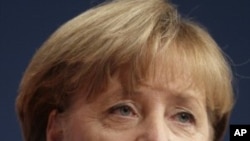German Chancellor Angela Merkel is calling for a stronger political union in Europe to overcome the bloc’s debt crisis. She called the crisis the continent’s “toughest hour since World War II.” And, in Italy, Prime Minister-designate Mario Monti was hard at work choosing members of his Cabinet.
Addressing thousands of delegates of her conservative party, Chancellor Angela Merkel made clear that Germany will have to make more sacrifices to deal with financial events in Europe.
Today, she said, Europe is in one of its toughest hours, maybe the toughest hour since World War II. It must be clear to us that we must not be discouraged by that. In 2008, she said, we managed to overcome the financial crisis with the motto that Germany would come out stronger from this crisis than we entered it. Now we must succeed in getting Europe out of this crisis stronger than when it entered it.
Merkel added that the European Union’s structure must be developed further. That, she said, means creating a Europe that ensures that the euro has a future.
The German chancellor said the euro is far more than just a currency. It is the symbol of European unification and it has become the symbol for half a century of peace, freedom and prosperity.
The leader of Europe’s biggest economy stressed that if the euro fails, so will Europe.
In Italy, Prime Minister-designate Mario Monti began talks Monday to create a new government of non-political experts. The effort follows the resignation of Silvio Berlusconi and the approval by parliament of emergency austerity and reform measures.
But political analyst James Walston, at Rome’s American University, says the fact that Berlusconi has stepped down does not mean he has abandoned politics.
"Berlusconi made his position very clear when he left on Sunday. He sent a video message to Italy saying that he is not finished, that he was - first of all he said he was very upset in personal terms because he has been, because of the celebrations when he left - but then in terms of substance he said he would double his efforts to continue his idea of renewing Italy," said Walston. "So at the moment, he is certainly not retired, he is not the retiring type."
Monti, a 68-year-old economics professor, has pledged to act "with a sense of urgency" to identify ministers in the new government and has said he hopes to secure a strong team. He was meeting various political parties throughout the day.
After he draws up what is expected to be a small Cabinet of technocrats and lays out its priorities, he will need to ensure that he has enough support in parliament to govern. Monti’s new government will be tasked with implementing economic reforms aimed at reviving a stagnant economy and decreasing public debt.
German Chancellor Merkel has welcomed signs of an end to the weeks of uncertainty in Italy. Monti could visit either France or Germany to meet Merkel and French President Nicolas Sarkozy within a week of a new government being in place.
Germany's Merkel Calls for United Europe












